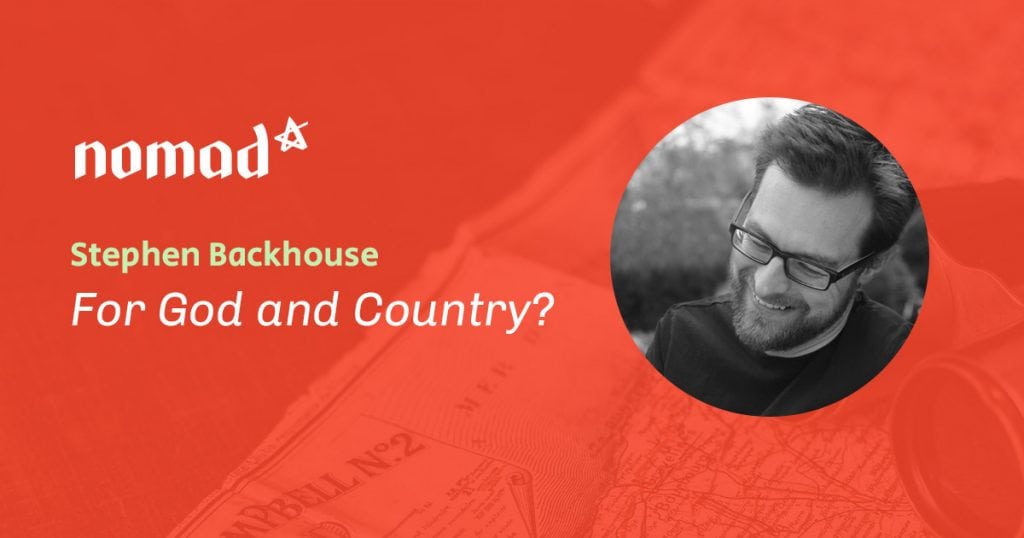Political theologian Stephen Backhouse believes that the earliest Christians tended to see patriotism as a vice – a temptation to guard against. Now it seems most Christians assume it is a virtue. Many of us, for example, don’t think twice about asking God to Save the Queen or Bless America.
So we ask Stephen whether the gospel is good news for our nations, what it means for a follower of Jesus to be a good citizen, whether we should be a blessing to our nation, or an unsettling presence, and how we should respond when loving our nation rubs up against our call to love our enemies.
After the interview, Nomad hosts Tim Nash and David Blower reflect on Stephen’s ideas and wonder how they might shape their own evolving faith.
Interview begins at 12m 28s

Image provided by Stephen Backhouse. Used with permission.
BOOKS
Essential Companion to Christian History
WEBSITE
QUOTES
“The trajectory of nationalism is always trying to find smaller and smaller groups – it’s tribalism. So, you’re always trying to reduce the amount of people that you have to be allegiant to. It’s the logic that, ‘I need to be around people that look like me and sound like me as much as possible,’ which is not actually a unifying trajectory. It almost by definition means you’re constantly trying to define who doesn’t count for you.”
“The early Christians saw patriotism as a vice to be guarded against. Now, Christians see it as a virtue to be embraced…a lot of the beating heart of discipleship in the New Testament is actually retraining people to not consider their national allegiance to be their primary allegiance anymore.”

6 Responses
I was thinking about the gift of speaking in tongues as the opposite of God’s confusing the one language in Shinar. The diversity is beautiful, and exist not only in people groups, but in nature as well, i.e. the trees, animales, climates etc. If God gives the sowers and reapers of his kingdom building, these abilities to speak in various languages, he doesn’t want their cultural idenity to change, he doesn’t want to force a nationalistic idenity upon them either. Certainly, if he wanted everyone to speak one language, he very well could have given the Holy Spirit the ability to give each beliver that one language. Regarding the Mennonites, I would say, they can be a bit nationalistic, in a similar way the Greek Eastern Orthodox Catholic Church here in the USA can be very patriatic to Greece, where there is a flag and all the litergy is in the Greek language. Some Mennonites have become more liberal, but many continue to mantain a kind of tribal mantality, so much so that most congregations are composed of four or five familie names. The Roman Catholic Church resisted allowing for this diversity buy keeping the litergy in Latin for thousands of years, but I believe the Reformation was a kind of “Tower of Babel” breakup, and see it as healthy. The question then becomes “What is the one Unifying glue that allows for the diversity in culture while also preserving our Christian Identity? Agápē love! God is Agápē. So we have the first two greatest commandments, and within those commandments we are directed to the Law and the Prophets, but as Christians through the lens of Christ in order to know how to unpack those two commandments. “The Sermon” (Mat 5,6,7) is a sufficient set of commandments that not only requires faith to obey, but also exceeds and fulfills the Law and the Prophets. To obey “the Sermon” then is the Agápē that transcend all the hangups Nationalism creates. The Dogmas in the Eastern and Western Catholic Churches are an example of hangups that creates disunity and anti-Agápē.
Sorry, RCC mass was in Latin for hundreds of years, just shy of thousands. Latin is a great language, but not so good when Chinese or Nahuatl is the vernacular of the peoples one is trying to proselytize.
Listening to this on ANZAC Day in Australia. It is a public holiday and some people display a worrying patriotism that excludes all they deem ‘unAustralian’, as if we (Aussies) are the only keepers of truth and courage, ‘mateship’ and the current political favourite, “a fair go for all”.
This rhetoric stands awkwardly and hypocritically alongside issues such as our popular inhumane refugee, asylum seeker policies of turning back boats and locking up those who are different. A lot of ANZAC day makes me uneasy. I feel it has become less a day of remembrance than a day of unreflective, flag waving.
A great, if somewhat uneasy podcast. Many thanks for this one.
Thanks Jacqui.
I wasn’t aware of ANZAC day, so it’s very interesting to hear your reflections on it.
Glad you found the episode helpful. Tim
recently i discovered Nomad, it was like wandering in the wilderness for years then suddenly finding my tribe.thank u so much,
So glad you found us Vincent! It’s wonderful to hear that you feel at home with us. Tim